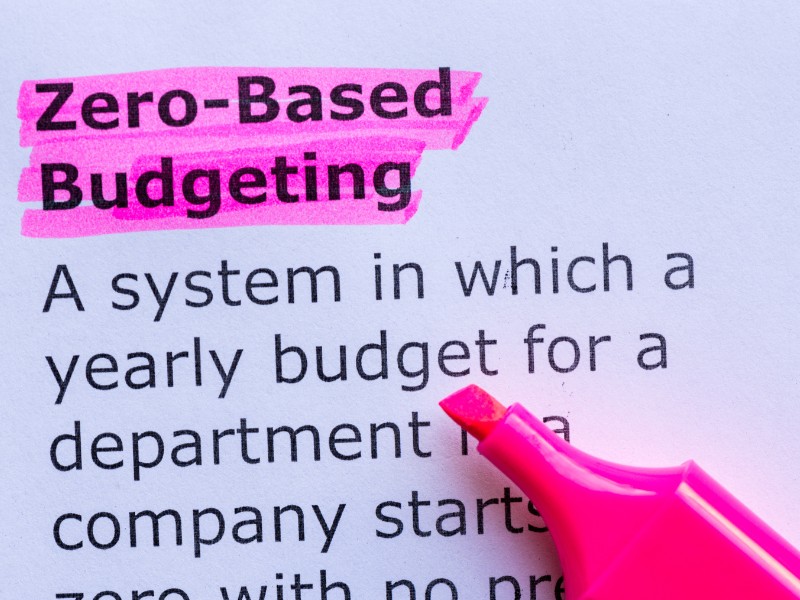The Zero-Based Budgeting Method Explained

This post may contain affiliate links. At no cost to you, we earn a commission from qualifying purchases.
Zero-based budgeting is a financial management approach that encourages you to allocate every pound of your income to specific expenses, savings, or investments.
Unlike traditional budgeting methods, which often involve merely tweaking last month’s budget, zero-based budgeting starts from scratch—hence the ‘zero-based’ name.
At the beginning of each month, the budget is set to zero and every penny is allocated a role, ensuring there’s no money left unaccounted for. This level of detail can provide a clearer view of where your money goes, which can be especially beneficial for families.
The Advantages of Zero-Based Budgeting
Promotes Financial Awareness
When it comes to financial awareness, zero-based budgeting acts almost like a magnifying glass that sharpens your focus on your monetary habits and commitments. With traditional budgeting, you might quickly scan through credit card statements or monthly bills, perhaps making minor adjustments to your planned spending.
However, zero-based budgeting prompts you to start from ground zero each month and thoroughly examine each allocation you make, down to the last pound.
Awareness of Trivial Expenditures
One of the most enlightening aspects of zero-based budgeting is its ability to spotlight even the most trivial expenditures that can add up over time. Suddenly, that morning coffee or weekly magazine takes on a new significance when you realise its cumulative effect on your family’s finances.
Forces Prioritisation
Another noteworthy element is the forced prioritisation that comes with this method.
As you allocate every pound to a specific category, you need to make tough decisions about what’s genuinely essential. Is that streaming service subscription more important than contributing to your child’s education fund?
Sometimes, you may have to forgo immediate gratification for long-term financial health, and being aware of this trade-off is beneficial.
Leads to Proactive Decision-Making
Financial awareness, gained through zero-based budgeting, also propels proactive decision-making. For example, if you see that a significant amount of money goes into dining out, you might decide to cook more meals at home to free up funds for other areas.
It’s this kind of informed decision-making that allows you to take control of your finances rather than being passively swept along by them.
Unveils Hidden Costs
Zero-based budgeting also unveils hidden or overlooked costs, such as bank fees or subscriptions you’ve forgotten about but are still paying for. This heightened awareness enables you to either eliminate these costs or factor them into your budget consciously.
Builds a Culture of Financial Responsibility
In a family setting, practising zero-based budgeting can help instil a culture of financial responsibility. When family members, even children, are made aware of where the money is going and the rationale behind each allocation, it sets the stage for open financial discussions and education.
This shared awareness and understanding can be invaluable for fostering financial literacy from a young age.
In summary, zero-based budgeting doesn’t just track your spending; it engages you in an ongoing dialogue with your finances. It’s this heightened sense of awareness and understanding that can serve as a bedrock for more informed, sensible financial decisions for the entire family.
Flexibility
Flexibility is one of the major selling points of zero-based budgeting. Unlike other budgeting models that tend to carry over the same figures month after month, zero-based budgeting is like hitting the reset button at the start of each month.
This fresh start not only offers room for adjustments but also provides the agility to adapt to your family’s ever-changing needs and circumstances. Here’s how this flexibility manifests itself in different ways.
Adjusting to Income Fluctuations
Let’s say one month you receive a bonus or work overtime, leading to a higher income. Zero-based budgeting allows you to allocate this extra income effectively rather than letting it get absorbed into non-specific spending.
Conversely, if you face a month with less income, you can also adapt your budget accordingly, reducing allocations in less critical areas.
Catering to Seasonal Expenses
Throughout the year, different months bring different kinds of expenses. There might be school fees at one point, holiday spending at another, and unexpected medical or repair bills somewhere in between. With zero-based budgeting, you can accommodate these seasonal or irregular expenditures seamlessly because you’re not tied to the rigidity of last month’s budget.
Navigating Life Changes
Life is unpredictable. Whether it’s a new addition to the family, an unexpected car repair, or a sudden job loss, circumstances can change drastically. Zero-based budgeting allows for the flexibility to reevaluate and reallocate your budget to meet new demands. This adaptability is especially beneficial for families, as they can have varied and sometimes unpredictable needs.
Trial and Error Without Long-Term Commitment
Suppose you decide to allocate a certain amount to eating out or entertainment and find that it’s either too much or too little. With zero-based budgeting, you don’t have to wait long to make adjustments. At the start of the next month, you can easily modify these allocations based on your experiences and insights from the previous month.
Encourages Financial Experimentation
This budgeting method also opens the door for some financial experimentation. If you want to test out allocating more money towards an investment or savings account, you can do so for a month and evaluate its impact on your overall financial picture. If it doesn’t work out, you can revert or adjust in the following month.
In essence, the flexibility of zero-based budgeting empowers you to be both proactive and reactive in managing your family’s finances. Each month serves as a new financial landscape where you can plot out your monetary commitments anew, keeping your budget aligned with your current reality.
This adaptability is particularly beneficial for families whose financial situations are neither static nor predictable.
Maximises Utility
When you think about utility in an economic sense, it often refers to the satisfaction or value derived from the consumption of goods or services. Zero-based budgeting is particularly strong in this aspect as it encourages you to allocate every pound with a purpose, thus optimising the utility of your income.
Let’s examine how zero-based budgeting maximises utility for your family’s financial life.
Ensuring Purposeful Spending
By giving each pound a designated role, you inherently ensure that the money is spent purposefully, aligning with your goals or needs. This targeted spending often leads to higher utility because you are consciously allocating funds to areas that matter most to you and your family, whether that’s paying down debt, saving for a home, or even affording quality time together.
Minimising Financial Waste
With every financial resource accounted for, there’s less room for wasteful or unplanned spending. This is one of the core strengths of zero-based budgeting—its ability to spotlight and eliminate financial “leaks”.
Whether it’s a forgotten subscription or impulse purchases that don’t provide long-term value, cutting out these kinds of expenses increases the overall utility you get from your income.
Enabling Better Planning for Investments and Savings
When you’re aware of where every pound is going, it’s easier to recognise opportunities for investment or savings. Maybe you realise that you’ve been allocating too much for dining out or shopping, and that money could better serve you if it were invested or saved.
Zero-based budgeting not only frees up this money but also helps you purposefully reallocate it to avenues that could potentially offer greater returns, be it an investment account, an emergency fund, or a retirement plan.
Facilitating Family Goals and Holidays
If you have a particular family goal like a summer holiday, zero-based budgeting can help you allocate specific sums towards it. By maximising the utility of each pound, you ensure that you’re not just spending but investing in experiences or assets that bring value and joy to the family.
With zero-based budgeting, you can work this goal right into your monthly plan, ensuring you’re consistently working toward it and deriving maximum utility from your income.
Adds Flexibility in Emergencies
Having an emergency fund is crucial for any family, and zero-based budgeting ensures you allocate money for this fund intentionally. An adequately funded emergency stash maximises utility in the sense that it provides peace of mind and financial security, something that’s often considered invaluable.
In conclusion, zero-based budgeting inherently gears you toward maximising utility by encouraging purposeful allocation of every pound you earn. It promotes thoughtful spending, prioritises meaningful savings, and ultimately ensures that your money works for you in the most effective way possible. Whether you’re looking to minimise waste or invest in experiences and goals that genuinely matter, zero-based budgeting serves as a robust framework to make it happen.
The Disadvantages of Zero-Based Budgeting
Time-Consuming
While zero-based budgeting offers several advantages, it’s important to note that it’s not necessarily a quick process.
The method asks for meticulous planning, which can be a drawback for those who are already time-strapped or find the level of detail overwhelming. Below are some aspects to consider regarding the time-consuming nature of zero-based budgeting.
Manual Tracking and Allocation
One of the first things you’ll notice about zero-based budgeting is that every pound has to be allocated. This isn’t just your major expenses like rent, utilities, or groceries, but also the smaller, less frequent costs like a birthday gift or an occasional night out.
Manually tracking and allocating these numerous categories can be a lengthy process, especially when you’re just starting out.
Reassessing and Reallocating
Because zero-based budgeting works on a month-by-month basis, the process repeats itself every new month. While previous months can serve as templates, changes in income, irregular expenses, or shifting priorities necessitate adjustments. This reassessment and reallocation can be time-consuming.
Requires Regular Monitoring
A budget is only as good as its implementation. To ensure that you’re sticking to your meticulously created budget, you’ll need to regularly monitor your expenditures and compare them against the planned amounts. This additional layer of vigilance requires more of your time.
Challenge of Variable Income
For families with a variable income—perhaps due to freelance work or multiple income streams—zero-based budgeting can be even more time-intensive. Fluctuating income levels mean that you can’t simply replicate last month’s budget but will have to create a new one that reflects your current financial state.
This adds an extra layer of complexity and can be a particular challenge for those who don’t have a stable, predictable income.
Involvement of All Family Members
For maximum effectiveness, all adult family members should ideally be involved in the budgeting process. This ensures buy-in from everyone and can help prevent misunderstandings or disagreements down the line. However, coordinating and reconciling everyone’s views and priorities is another task that requires time and effort.
Finding a Balance
While the time investment is a considerable factor, it’s also essential to balance it against the benefits that zero-based budgeting can bring, such as financial awareness and utility maximisation. For some, the initial time spent laying the groundwork will decrease as they become more adept at the process and can more easily adjust the budget month to month.
Zero-based budgeting isn’t a set-it-and-forget-it method; it asks for your consistent attention and time. This level of commitment can be daunting for some, particularly for families juggling numerous responsibilities or those with variable income streams.
However, if you find the time investment pays off in terms of better financial control and peace of mind, the effort may very well be worth it.
Potentially Stressful
Zero-based budgeting comes with many merits, but it’s not devoid of drawbacks.
One such downside is the potential for stress, especially when there’s a tightrope walk between income and expenditures. When every pound is accounted for and allocated to specific costs or goals, the absence of a financial cushion for unexpected expenses can become a source of anxiety.
Here are some aspects to consider.
The ‘Zero’ in Zero-Based Budgeting
The fundamental principle of zero-based budgeting is to allocate every pound so that you end up with zero at the end of the month. While this approach is excellent for maximising utility and minimising waste, it leaves no room for spontaneity or unplanned costs unless you’ve designated funds for such situations.
Emergency Funds and Contingencies
The lack of a buffer in a zero-based budget can be mitigated by specifically setting aside money as a contingency or emergency fund. However, building this fund takes time, and until it reaches a comfortable level, any unexpected costs could lead to financial stress.
If a sudden expense does arise and there’s no cushion to absorb it, you’re back to the drawing board to reallocate and readjust, which can be stressful.
Psychological Pressure
Knowing that every pound is earmarked for something specific can exert a psychological pressure of its own. Some family members might find this level of financial rigidity stressful, especially those who prefer a bit more fluidity or freedom in their spending.
The “every pound has a job” philosophy can sometimes feel more like a financial straitjacket than a liberating tool for financial health.
Fear of Overlooked Expenses
In zero-based budgeting, there is a stress-inducing fear of having overlooked something. Forgetting to allocate money for an upcoming school event, vehicle maintenance, or even a friend’s birthday can throw a spanner into your well-laid plans, forcing stressful last-minute rearrangements.
Stress of Consistent Monitoring
The need for regular monitoring and adjustments, a characteristic of zero-based budgeting, can add to stress levels. Families who already have a lot on their plate might find this ongoing need for financial vigilance to be an added burden.
Balancing Stress and Benefits
While the stress factor is real, it’s also worth noting that many find the clarity and control offered by zero-based budgeting to outweigh the downsides. If the method aligns well with your family’s financial goals and lifestyle, you might find that the stress decreases over time as you become more accustomed to the process.
While zero-based budgeting offers a detailed and purposeful approach to managing finances, the very features that make it effective can also make it a potential source of stress.
However, the level of stress experienced can vary from family to family and even individual to individual. Being aware of this aspect allows you to make a more informed decision on whether this budgeting method is the right fit for your family’s financial landscape.
Is Zero-Based Budgeting Right for Your Family? Weighing the Pros and Cons
When it comes to managing family finances, the approach has to be as unique as the family itself. Zero-based budgeting, with its meticulous allocation of every pound, can be an excellent tool for families that have a knack for financial discipline and a desire for deep financial awareness.
However, it’s not a method that fits every household. Here’s what to consider when determining if it’s the right fit for your family.
Alignment with Financial Goals and Lifestyle
If your family’s financial goals include detailed tracking, minimising waste, and maximising the utility of every pound, then zero-based budgeting aligns well with these objectives.
It offers a high level of control, which can be empowering for some but restrictive for others. It’s crucial to know whether this level of micromanagement resonates with your family’s lifestyle and financial aspirations.
Time Investment
One of the key considerations is the time you’re willing to invest. Zero-based budgeting is not a set-and-forget model; it requires ongoing adjustments, which can be time-consuming. If your family leads a hectic life and time is already at a premium, this method may add undue stress.
Emotional Commitment and Family Dynamics
It’s essential that all family members (or at least the adults responsible for financial decisions) are on board with the zero-based budgeting method. If even one person is resistant or uncommitted, it could create tension and undermine the system’s effectiveness. Open and honest communication about whether everyone is willing to make the emotional investment is key.
Income Stability
Another vital aspect to weigh is the stability of your income. Families with a stable, predictable income might find zero-based budgeting easier to implement than those with variable income streams. The fluctuating nature of freelance work, for example, could make this budgeting method challenging and more time-consuming.
Stress Factor
While this method can foster a sense of financial control, it also comes with the potential for stress, particularly if unplanned expenses crop up and disrupt your zero-based budget. Assess your family’s tolerance for this type of stress against the benefits of thorough financial tracking and maximised utility.
Willingness to Adapt
The success of zero-based budgeting hinges on your willingness to adapt and recalibrate. If your family is comfortable with occasional reassessment and course correction, this approach may work well for you.
Final Thoughts
Budgeting is highly personal, and while zero-based budgeting has its merits, it’s essential to weigh the pros and cons in the context of your family’s unique needs and dynamics. It can be a powerful tool for those willing to put in the effort, but it’s just one of many budgeting methods out there.
It wouldn’t hurt to give it a try for a couple of months, just to see if it fits your family’s financial landscape. If it doesn’t work, there are plenty of other methods you could explore.
Featured image by Sohel_Parvez_Haque via Canva.com



